15 Best Law Schools Rankings In US 2025
The Best Law Schools Rankings in the US 2025 is a collected evaluation of law campuses in the United States that analyzes and highlights the top institutions according to several criteria such as academic credibility, faculty, quality resources, and program offers. Organizations, journals, and educational platforms publish such law school rankings to help aspiring law students make informed judgments on where to pursue their inclinations in legal instruction.
A law school is a reputable educational body that offers legal study leading to the award of a juris doctor JD degree. Law schools deliver a complete education that qualifies students for upcoming designations in law and the problems of the legal profession. The primary purpose of a law school is to teach and train individuals into competent and ethical legal practitioners. Law schools strive to deliver learners with the information, analytical abilities, and ethical values needed to negotiate the complexity of the legal system and make a significant contribution to the community through legal work.
Signing up in a law school ushers several advantages including the acquisition of legal information, critical thinking abilities, and professional exposure. Law school is required to acquire a juris doctor degree and to pass the bar exam, necessary steps toward becoming a licensed attorney. Law schools include networking avenues, apprenticeships, and particular courses that help students advance their legal careers.
Law schools in the United States have existed since the 17th century. The college of William and Mary established the first legal society in America in 1779 to embrace the values of the American Revolution. The program’s goal was to generate well-educated citizen lawyers who were capable leaders for the newly created republic. The Litchfield Law School was founded in 1784 by Judge Tapping Reeve to arrange the vast number of would-be apprentices or lecture-goers he attracted. It was the first entity constructed solely for teaching law. Harvard Law School was the first to establish modern law schools in 1817. Law schools grew in number over time and the legal learning structure evolved to accommodate the shifting requirements of the legal sector and its community.
Choosing the finest law school entails considering several aspects such as academic credibility, teacher credentials, available concentrations, resources, and location. Prospective students must consider the school’s bar passage rates, alumni success, career objectives, and learning preferences. Law school rankings are a good starting point in the decision-making process; however, prioritize one’s inclinations and objectives when deciding the best fit for a legal education.
Some of the best law schools in the US are listed below.
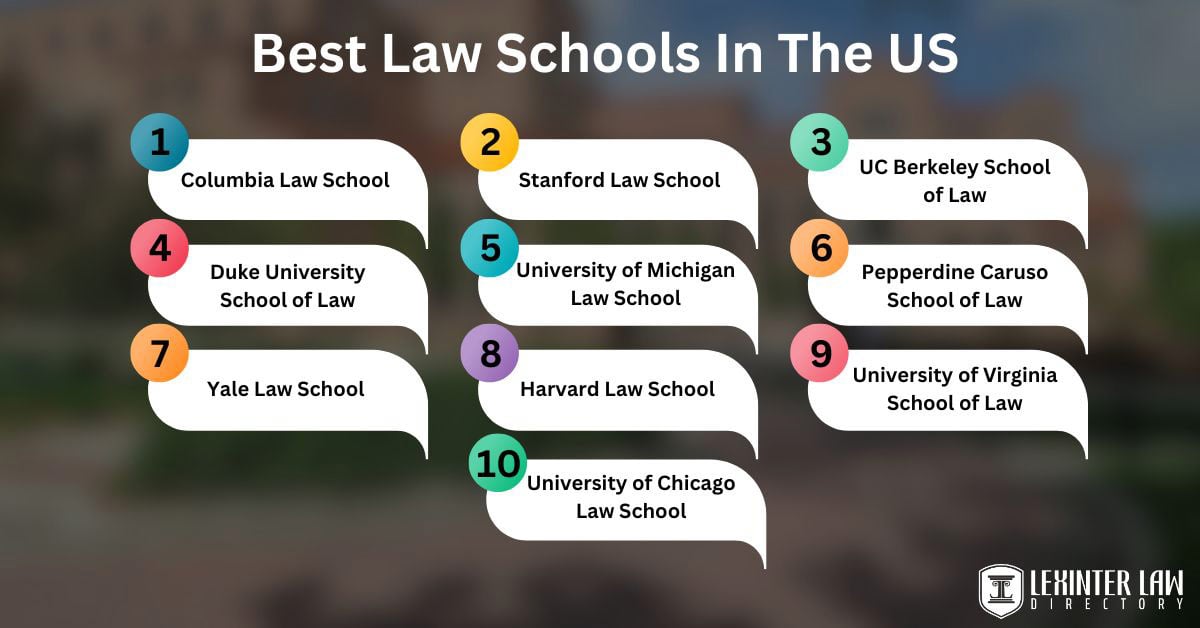
- Columbia Law School: The Columbia Law School is part of Columbia University and is recognized for its excellent educational offerings and diversified workforce. The law school allows students to interact with legal experts and institutions in one of the world’s major legal capitals.
- Stanford Law School: Stanford Law School is part of Stanford University and is well-known for its creative technique for legal teaching. It motivates the learners to investigate the nexus of law technology and commerce by stressing integrative studies.
- UC Berkeley School of Law: The Berkeley Law School or the University of California-Berkeley School of Law is popular for its devotion to social justice and general interest legislation. Its accessible location puts students near influential legal and technology companies.
- Duke University School of Law: Duke University School of Law in North Carolina is distinguished for its distinguished professors and dedication to experiential learning. Students are prepared for an array of legal disciplines due to its interactive and integrative approach.
- University of Michigan Law School: The University of Michigan Law School is recognized for its distinguished professors and worldwide outlook on legal education. It provides a well-rounded legal education by emphasizing research and practical skills.
- Pepperdine Caruso School of Law: Pepperdine University’s School of Law is highly dedicated to ethical leadership and conflict resolution. Its gorgeous coastline setting gives a one-of-a-kind setting for law study.
- Yale Law School: The Yale Law School is part of Yale University and is famous for its academic rigor and generating notable legal experts. Its prestigious reputation stems from its small class numbers and engagement in community welfare.
- Harvard Law School: The Harvard Law School is part of Harvard University and is one of the world’s oldest and most distinguished law schools. The school provides a thorough legal education and is esteemed for its influential faculty and substantial resources.
- University of Virginia School of Law: The University of Virginia School of Law is famous for emphasizing legal writing and critical thinking skills. The university offers students an encouraging environment and a rich legal history.
- University of Chicago Law School: The University of Chicago Law School is regarded for its demanding academic offering and inclination to multifaceted research. The institution has produced significant legal scholars and practitioners over the years.
Table of Contents
- 1. Columbia Law School
- 2. Stanford Law School
- 3. UC Berkeley School Of Law
- 4. Duke University School Of Law
- 5. University Of Michigan Law School
- 6. Pepperdine Caruso School Of Law
- 7. Yale Law School
- 8. Harvard Law School
- 9. University Of Virginia School Of Law
- 10. University Of Chicago Law School
- 11. Northwestern Pritzker School Of Law
- 12. Penn Carey Law
- 13. NYU Law
- 14. Cornell Law School
- 15. Georgetown University Law Center
- How To Choose The Best Law School In The US?
- How Long Is Law School In The US?
1. Columbia Law School
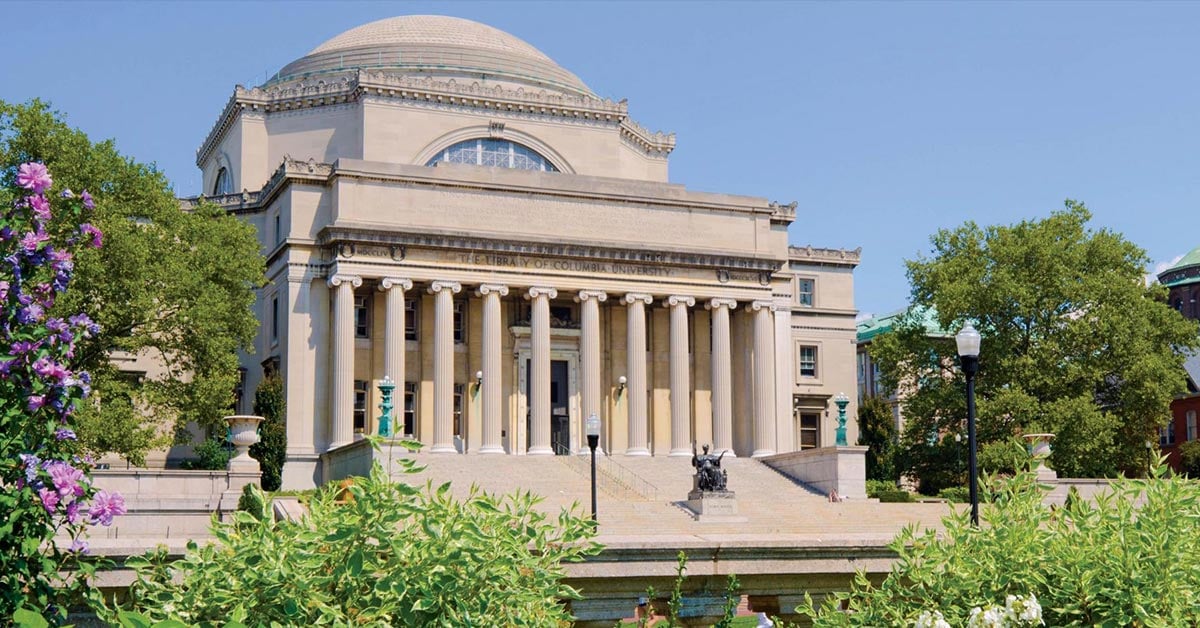
Columbia University is a member of the Ivy League college acclaimed for its educational value and global significance in various fields, including law. Columbia Law School, a division of Columbia University, is routinely listed among the world’s top legal schools, renowned for its illustrious professors, challenging academic programs, and essential role in developing legal study and practice.
Columbia University was built in 1754 as King’s College by the Royal Charter of King George II of England, making it one of the earliest institutes of advanced study in the United States. Its history is defined by its devotion to academic research and the production of influential leaders in several sectors.
The university is located on Broadway in the heart of New York City. The Low Memorial Library, erected in the Roman Classical style and currently housing the university’s primary administration offices, is its principal landmark. Columbia University maintains two facilities outside of Manhattan, the Nevis Laboratories in Irvington, New York, which is a center for the study of high-energy experimental particle and nuclear physics, and the Lamont-Doherty Earth Observatory in Palisades, New York.
The acceptance rate in Columbia University is 11.9%, indicating its highly selective admissions procedure. Prospective students applying to Columbia Law School must submit Law School Admission Test (LSAT) scores between 170 and 175, demonstrating the institution’s commitment to admitting candidates with excellent intellectual capacity.
Admission requires an excellent academic record, with a GPA criterion ranging between 3.81 and 3.96. It demonstrates the university’s focus on academic success and the development of a diverse student body. Columbia Law School graduates demonstrate their readiness for the legal profession with a 95.6% bar exam passage rate, confirming the institution’s dedication to providing a complete and successful legal education.
Columbia Law School provides a variety of law degrees, including the Juris Doctor (JD), Master of Laws (LLM), and Doctor of the Science of Law (JSD) programs for students interested in advanced legal study. The high-quality education is expensive at Columbia Law School, with the tuition reaching $84,820. It represents the financial investment required for students to profit from the institution’s illustrious faculty, cutting-edge facilities, and the unique opportunities afforded by its location in renowned legal and financial hubs.
2. Stanford Law School
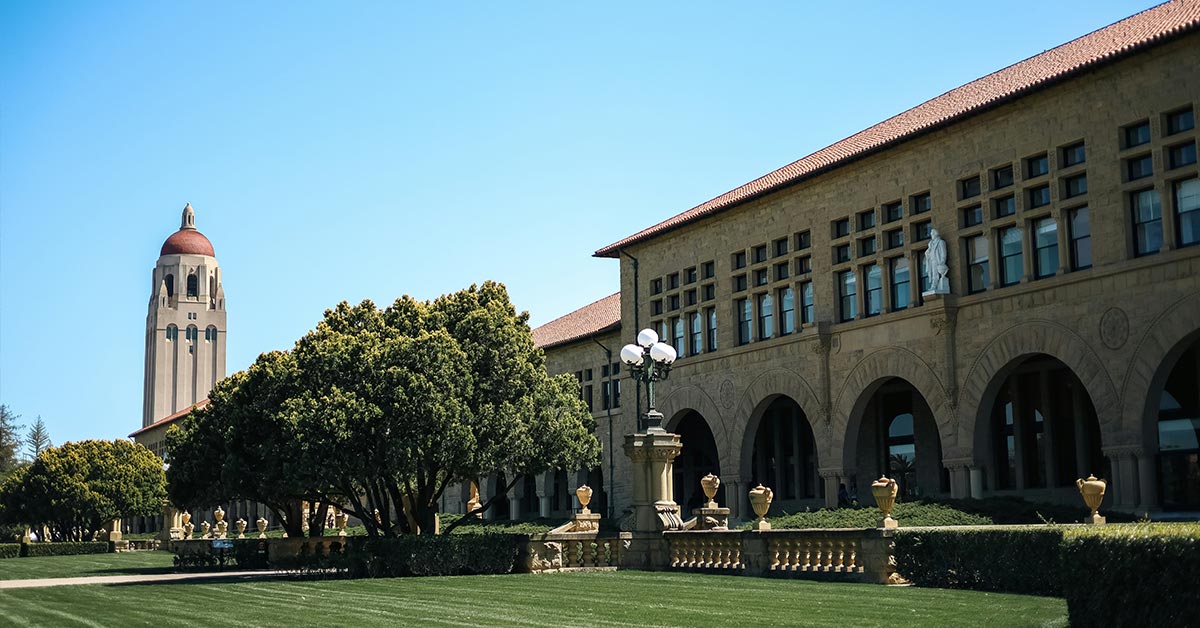
Stanford University is among the most prestigious colleges in the world, owning one of the most expansive universities in the US. Stanford Law School is part of a prominent university and is renowned for its innovative method of legal education.
Stanford University had constructed a linear accelerator by 1970 and was instrumental in the early development of the Internet. The main campus, which spans 8,180 acres, houses all undergraduate students, 700 major university buildings, and 40 departments. It is spread among three academic schools, four professional schools, and 18 independent laboratories, centers, and institutes.
Stanford has many accomplishments, including 21 Nobel laureates and a large network of influential alumni in commerce, politics, journalism, sports, and technology. The historical relevance of Stanford is demonstrated by Herbert Hoover, the 31st President of the United States, who was a member of the university’s initial class in 1895, earning a degree in geology. Stanford has emerged as a major producer of U.S. Members of Congress, which contributes to Congress’s clout in American politics.
The university was founded in 1885 and officially opened six years after its foundation as a private, co-educational, and non-denominational university. Stanford Law School has had a substantial impact on legal study, pioneering new approaches to legal issues. Stanford University is located in Stanford, California’s Silicon Valley, less than an hour’s drive south of San Francisco, near Palo Alto. The entrepreneurial atmosphere at the university is widely recognized.
Stanford University has a highly competitive acceptance rate of 8.9% and sets a high admissions criterion. Prospective law students wishing to attend Stanford Law School must get an LSAT score of 173, demonstrating the institution’s dedication to enrolling applicants with superior analytical and reasoning abilities. The GPA criterion ranges from 3.78 to 4.00, highlighting the significance of a strong academic record. Stanford Law School graduates have a 99.4% bar exam passage record, demonstrating the efficiency of the institution’s legal program in qualifying students for professional employment.
Stanford Law School provides degrees such as Juris Doctor (JD), Master of Laws (LLM), and Doctor of the Science of Law (JSD) to meet the unique requirements and goals of its students. Each program is designed to offer students the knowledge, skills, and intellectual rigor they need to succeed in their chosen legal route.
Such greatness comes at a significant financial cost, as full-time tuition fees total $76,608. Candidates must be prepared to pay an application fee of $85 as a full-time student, reflecting the enormous costs of completing legal education at the finest law schools in the United States.
3. UC Berkeley School Of Law
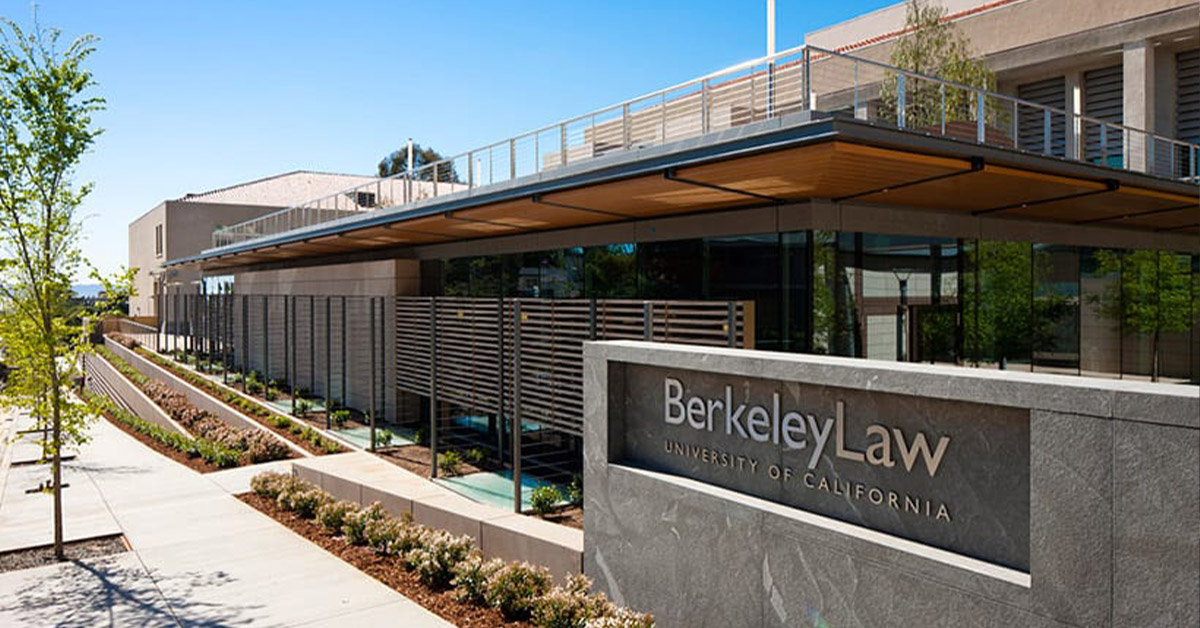
The University of California, Berkeley, is a nonprofit research institution recognized as one of the most prominent state universities in the US. A component of the University of California System.
Berkeley academic members have received 19 Nobel Prizes, the majority of which have been awarded in physics, chemistry, and economics. The campus has a Botanic Garden, created in 1890, and the 60,000-capacity California Memorial Stadium used by the university’s sports teams. Berkeley’s sports teams are represented by the Golden Bear.
The university was built in 1868. Berkeley’s colors of blue and gold were chosen in 1873, with blue signifying the California sky and ocean and gold representing the “Golden State” of California. Berkeley developed from a state constitutional idea for a university that provides a greater contribution to the pride of the next generation than California’s wealth. The university was a center of anti-Vietnam War student protests during the 1960s and 1970s.
The university is located in the San Francisco Bay Area and has approximately 27,000 undergraduate and 10,000 postgraduate students. It provides students with access to a thriving legal community, powerful industries, and a wide range of possibilities for hands-on practice and networking.
The University of California, Berkeley School of Law has a competitive acceptance rate of 17.3%, reflecting the institution’s selective admissions process. Prospective Berkeley Law students are required to display extraordinary academic prowess, with a minimum GPA of 3.87. A competitive LSAT score of 167 is additionally required, stressing the importance of excellent analytical and reasoning abilities in the admissions process.
Berkeley Law graduates have a solid 99.2% bar exam passage rate, demonstrating the quality of the institution’s legal curriculum in preparing students for the professional difficulties ahead. Berkeley Law School offers a comprehensive legal education, an LLM program for international and domestic legal professionals pursuing advanced studies, and a JSD program for individuals committed to rigorous legal education.
The tuition price at Berkeley Law is $66,454 (in-state) and full-time: $78,881 (out-of-state), despite the prominence and quality of education it provides. The university offers a more affordable rate than some private rivals while acknowledging the financial commitment required for legal education at a recognized public university. Berkeley Law is a prestigious alternative for students seeking legal education on the West Coast because of its strict admissions criteria, academic brilliance, and high bar exam passage rate.
4. Duke University School Of Law
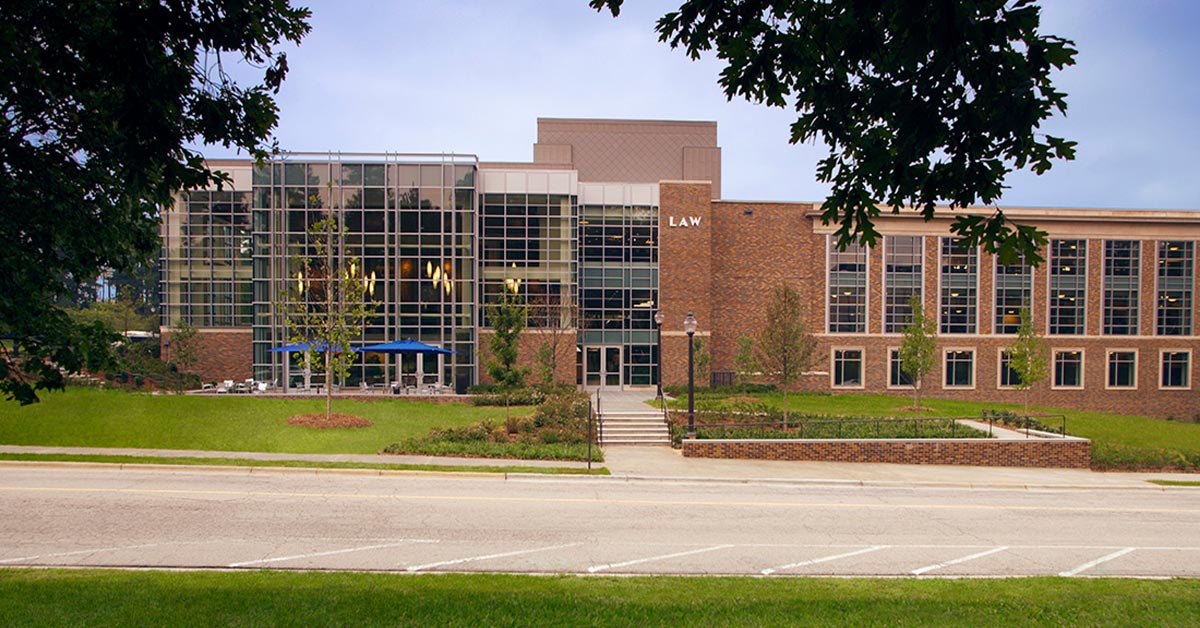
Duke University is among the finest private universities in the US and a pioneering contributor of internationally-equipped scholars. The Duke University School of Law is a prominent independent law school affiliated with Duke University, famous for its academic excellence, commitment to multidisciplinary studies, and global perspective.
Duke Law School is known for its vibrant intellectual community, renowned faculty, and emphasis on hands-on learning through clinics and externships. The university comprises 10 schools and colleges, such as the Trinity College of Arts and Sciences, the oldest, founded in 1859. The youngest is the Nicholas School of the Environment, founded around 25 years ago. Approximately 95% of all students in the university graduate within four years after enrollment. The popular majors in the 2015 entrance class were public policy, economics, biology, biomedical engineering, and psychology.
Richard Nixon, the 37th President of the United States, is its most prominent alumnus who received a law degree from Duke University in 1937. Sports and performance art thrive at Duke University, competing in athletics and basketball and offering more than 60 art events yearly.
The university was founded in 1838 as Trinity College but was renamed Duke University in 1924 when the Duke Endowment was formed. The institution describes itself as fresher than the majority of the country’s famous research universities. The original site was reconstructed in Georgian architecture and is now known as East Campus after the 1930 building of the West site, Gothic in style and home to the spectacular Duke Chapel tower. The school has changed, adopting new approaches to legal studies and research over time. Duke Law is dedicated to developing ethical and globally aware lawyers.
Duke University is located in the US state of North Carolina. Duke Law School benefits from its position in the South and closeness to the Research Triangle Park, a technological and research cluster. The school offers a supportive and engaging environment for students, while the region affords unique opportunities for legal work and interaction with a diverse legal sector.
The selective admissions process at Duke University School of Law yields a competitive acceptance rate of 13.9%. Prospective candidates wishing to attend Duke Law School must exhibit high analytical and reasoning abilities, with an LSAT score between 168 and 171. The college prioritizes academic performance, with a GPA requirement ranging from 3.79 to 3.96, demonstrating the significance of a strong academic record in the admissions evaluation. Duke Law School graduates pass the bar test with a 79.3% rate, demonstrating that the institution provides a solid basis for success in the legal profession.
Duke Law School’s JD program provides a thorough legal education that prepares students for law practice. The Master of Judicial Studies degree focuses on the judiciary, whereas the LLM program focuses on advanced legal studies. Individuals interested in advanced legal research and scholarship must apply to the SJD program.
Duke University’s tuition fee of $78,774 reflects the cost of a private legal education. Duke Law School’s commitment to providing a world-class legal education, renowned faculty, and a vibrant intellectual community contributes to its standing as a distinguished choice for legal education. Duke Law School is a respected university for students seeking complete legal training in a collaborative and inventive atmosphere, due to its strict admissions criteria, strong academic focus, and well-rounded legal curriculum.
5. University Of Michigan Law School
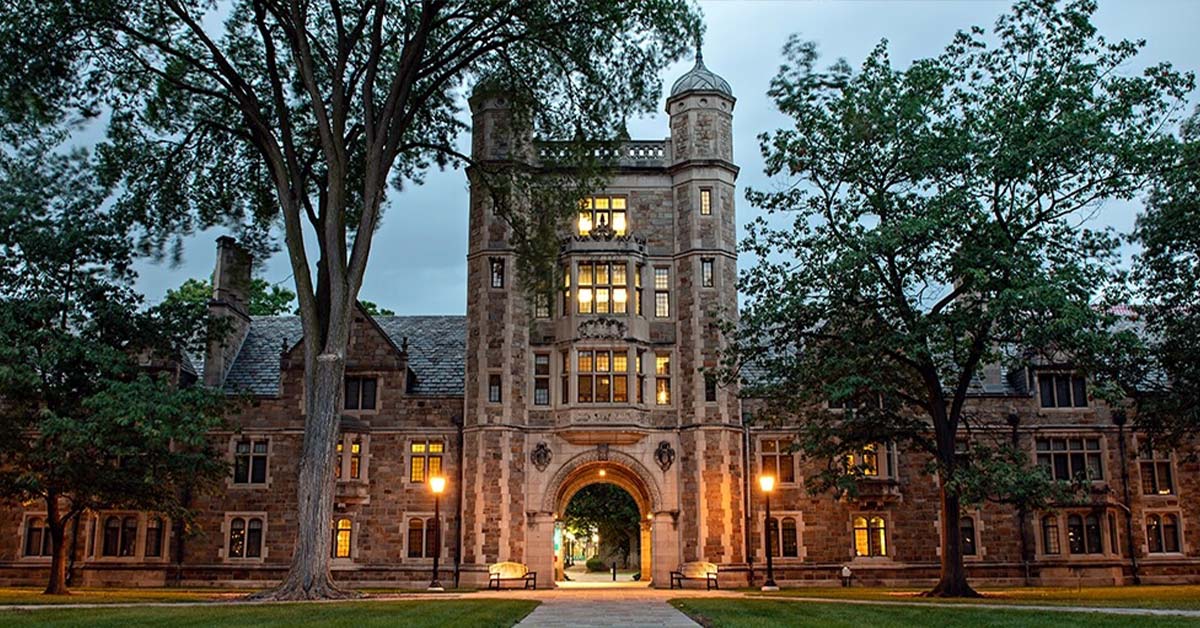
The University of Michigan Law School is a recognized non-profit law school that is part of the University of Michigan. Michigan Law is a recognized institute in legal studies, appreciated for its devotion to academic excellence, multidisciplinary courses, and an intense concentration on civic engagement and societal equity.
The University of Michigan is one of the country’s largest research universities. The University of Michigan University’s objective is to serve the residents of Michigan and the globe by “creating, communicating, preserving, and applying knowledge, art, and academic values, and developing leaders and citizens who challenge the present and enrich the future.” The university has 250 undergraduate majors, 100 doctoral programs, 200 master’s programs, and over 1,400 student clubs. Its graduates include former US President Gerald Ford, Google co-founder Larry Page, and Darth Vader actor James Earl Jones.
The University of Michigan Law School, founded in 1817, has a long tradition of legal scholarship and advocacy. The school has changed, responding to shifting legal landscapes and continually contributing to advances in legal education and research over the years. The university’s athletic legacy dates back to 1865, and its sports teams, known as the Michigan Wolverines, have won more than 50 national titles in 12 sports. The university had grown to become the largest in the country by 1866.
The University of Michigan is located west of Detroit in Ann Arbor. The cultural diversity of Ann Arbor provides students with numerous possibilities for participation, making the University of Michigan Law School an appealing choice for anyone seeking a well-rounded and meaningful legal education.
The acceptance percentage at the University of Michigan Law School is 11.9%, indicating a challenging admissions process that chooses students with high academic and analytical talents. Prospective students interested in attending Michigan Law must submit a competitive LSAT score ranging from 166 to 172, indicating the institution’s dedication to enrolling individuals from varied yet highly skilled backgrounds. The 3.9 GPA criterion emphasizes the importance of a strong academic record in the admissions process, reflecting the focus on academic success. Graduates of the University of Michigan Law School have a noteworthy bar exam passage record of 98.2%, attesting to the institution’s legal education’s efficiency in educating students for profitable legal practice.
The Michigan Law School provides a complete legal education that prepares students for law practice through its JD program. The LLM degree is for advanced legal studies, while the SJD program is for individuals interested in cutting-edge legal research. The dual-degree choices at the school allow for interdisciplinary courses, demonstrating the institution’s dedication to a balanced legal education.
The university’s tuition is full-time: $72,974 (in-state) and full-time: $75,974 (out-of-state), giving Michigan Law School a viable option for a quality legal education. The commitment to quality at Michigan Law School, supported by renowned faculty and a broad curriculum, distinguishes it as an institution for students seeking a comprehensive legal education. The University of Michigan Law School is a prestigious choice for prospective law students due to its strict admissions requirements, commitment to diversity, and proven record of success in the legal profession.
6. Pepperdine Caruso School Of Law
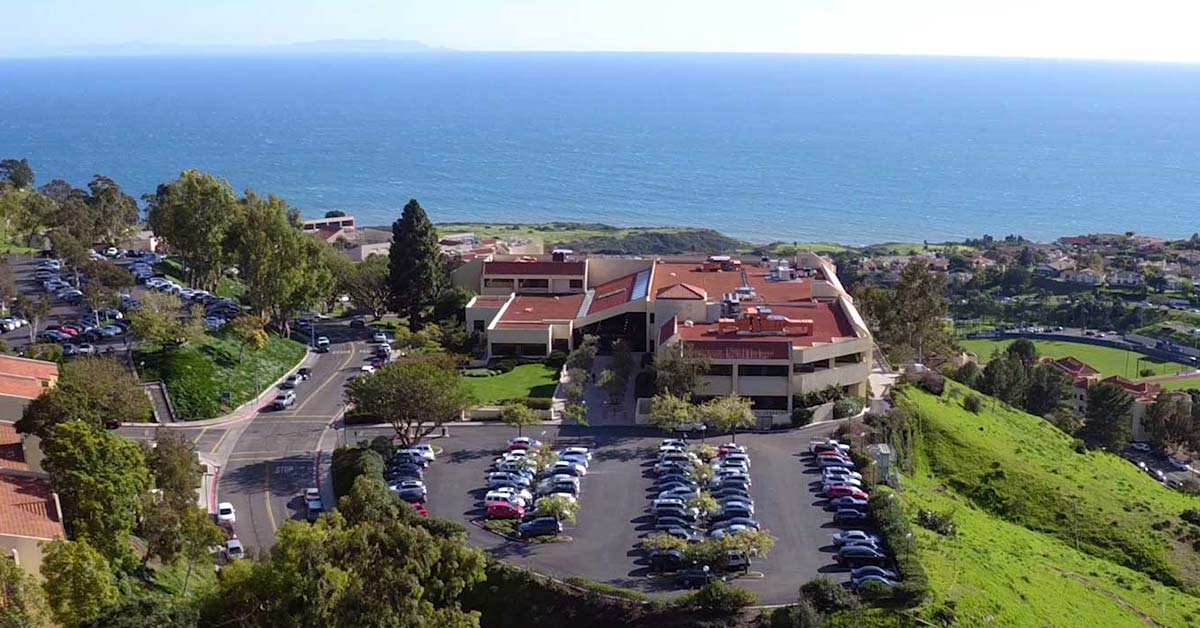
Pepperdine University is a recognized institution affiliated with the church of Christ. The Pepperdine Law School, belonging to Pepperdine University, is a unique institute in legal studies recognized for its devotion to ethical leadership, mediation, and a distinctive focus on incorporating faith and values into legal education.
Pepperdine University in Malibu, California, provides an array of courses comprising business management, humanities, teacher education, communication, fine arts, languages, international studies, religion, philosophy, natural science, social science, and legal education. Pepperdine is a member of the Yellow Ribbon Program, which provides unrestricted assistance for veteran students and a financial contribution toward their tuition. Pepperdine University has fourteen NCAA Division I teams, including basketball, baseball, tennis, volleyball, and golf. The university mandates students to participate in 14 spiritual activities every semester and finish no less than three religious subjects in the course of their education, which are centered on New Testament-based traditions of the Churches of Christ. Kim Victoria Fields, Tia Dashon Mowry-Hardrict, and CNN anchor Bill Weir are among its prominent alumni.
Pepperdine University School of Law was founded in 1969 and has a long tradition of providing a values-based legal education. The school has grown to embrace cutting-edge approaches to legal study, focusing on practical skills and ethical considerations. The Churches of Christ association exemplifies Pepperdine Law’s dedication to blending legal education with principles.
Pepperdine University is situated in Malibu, California, on the Pacific Coast Highway overlooking the pacific ocean. The picturesque 830-acre campus is 24 miles away from Beverly Hills, 54 miles from Disneyland, and about an hour away from Los Angeles, making it excellent for students who want to visit the neighboring places.
The acceptance rate at Pepperdine University School of Law is 28.4%, indicating a cutting-edge admissions procedure. Applicants wishing to attend Pepperdine Law must get an excellent LSAT score of 164, demonstrating the institution’s commitment to enrolling individuals with outstanding analytical and reasoning abilities. The 3.8 GPA criterion emphasizes the importance of academic success in the admissions process, emphasizing the value of scholastic achievement. Pepperdine Law School graduates pass the bar exam with a rate of 73.2%, demonstrating the institution’s legal study efficiency in preparing students for effective legal employment.
The university provides a few law degrees, including the Juris Doctor (JD) program, the cornerstone of Pepperdine Law’s offerings, providing learners with a thorough legal preparation. The Master of Laws (LLM) degree is for individuals interested in advanced legal studies, whereas the Master of Dispute Resolution (MDR) program is unique in that it focuses on alternative conflict resolution approaches. Pepperdine Law’s dedication to multidisciplinary education is shown in the dual JD/MBA program. The tuition cost at the university is $70,556, which includes the value of the institution’s distinctive programs, renowned faculty, and experiential learning experiences.
7. Yale Law School
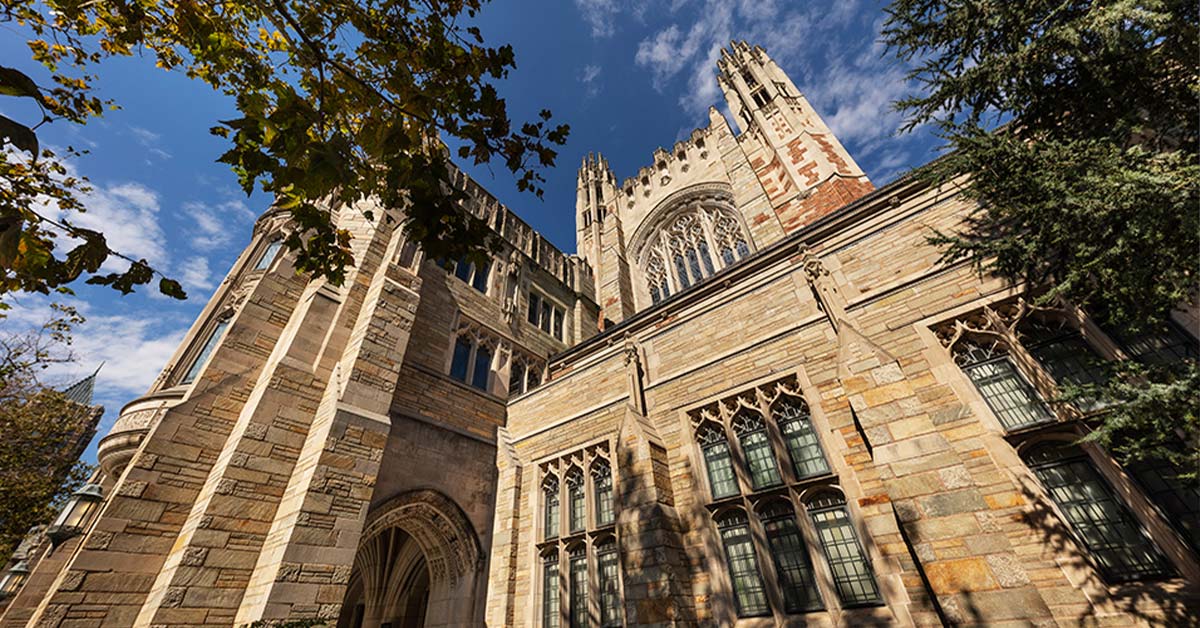
Yale University is the third-oldest higher education establishment in the United States and a private Ivy League research university. Yale University Law School is an internationally recognized private law school affiliated with Yale University that is known for its unrivaled academic reputation, dedication to intellectual rigor, and production of significant legal academics and practitioners. Yale Law School distinguishes itself by small class numbers, a high faculty-to-student ratio, and a commitment to creating a personalized and interactive educational environment.
Yale University is a famous institution with 14 schools that offer a broad liberal arts curriculum in the humanities, arts, sciences, and social sciences. The 260-acre central campus of the university contains ancient structures dating back to the mid-18th century. Students are housed in residential colleges similar to buildings found in Oxford and Cambridge. Yale University is one of the wealthiest and most intellectually robust schools in the world, with an endowment surpassing $25 billion and a library housing more than 15 million volumes. Yale University has a distinguished alumni list of five U.S. presidents, including William Howard Taft, Gerald Ford, George H. W. Bush, Bill Clinton, and George W. Bush, and some influential figures such as Hillary Clinton, John Kerry, and actress Meryl Streep.
The university was founded in 1701 as the Collegiate School in Saybrook, Connecticut, and transferred to New Haven after 15 years. The university was renamed Yale College in 1718 after Welsh donor Elihu Yale. It was the first university in the United States to offer a Ph.D. in 1861.
The Yale Law School is located in New Haven, Connecticut, and benefits from the intellectual and cultural richness of its historic campus. Students are close to legal, political, and financial centers, giving unique possibilities for experiential learning, networking, and engagement with notable legal practitioners.
Yale University Law School has a low acceptance rate of 5.3%, owing to its selective admissions method, which accepts just a small fraction of applications. Prospective candidates wishing to attend Yale Law School must get an extraordinary LSAT score of 174, showing the institution’s dedication to enrolling individuals with high analytical and reasoning talents. The unweighted 4.0 GPA requirement emphasizes the value of academic performance in the admissions process and positions Yale as a destination for top-tier academic performers. Yale Law School graduates have an amazing 99% bar exam clearance record, demonstrating the successful outcome of the institution’s law school program.
Yale University offers Juris Doctor (JD) programs, which are the standard legal education degrees in the United States. Furthermore, the institution offers higher legal studies through Master of Laws (LLM) and Doctor of Science of Law (JSD) degrees. The LLM program is designed for international students or those seeking specific legal knowledge, whereas the JSD program is a doctoral research program. Yale Law School’s tuition fee is $76,369. Its reputation for academic brilliance, powerful professors, and enormous resources all contribute to its position as one of the world’s top law schools.
8. Harvard Law School
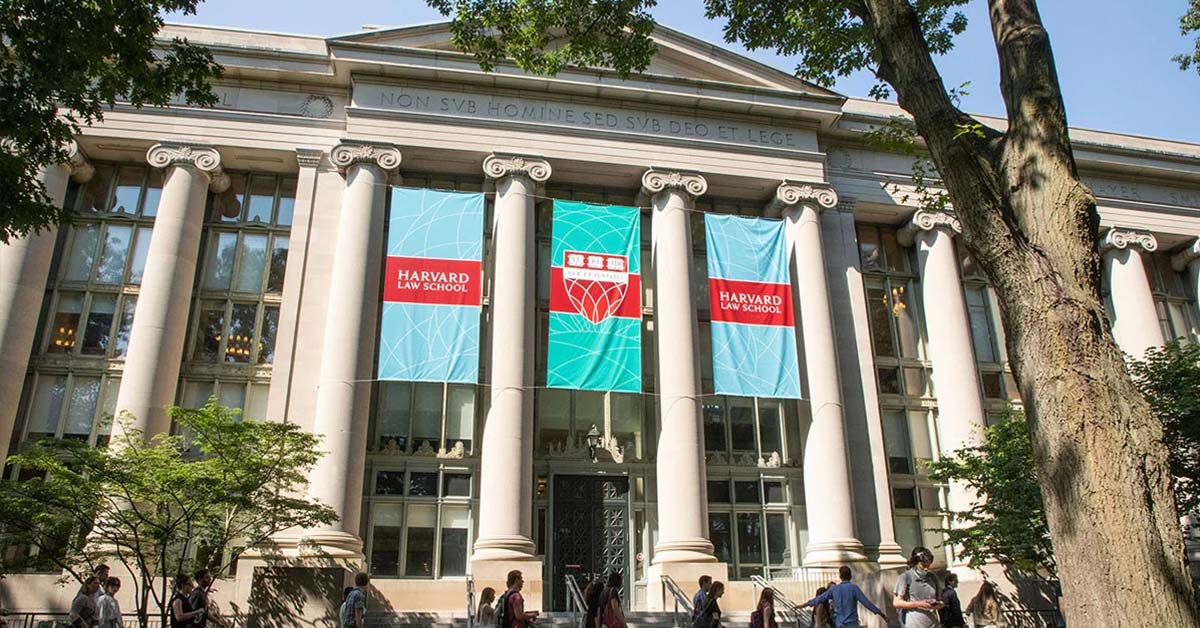
Harvard University is the oldest in the United States and one of the most prestigious in the world. The university is affiliated to the private Ivy League having connections to more than 45 Nobel laureates, over 30 presidents of state, and 48 Pulitzer Prize winners. Harvard University generates significant legal researchers, practitioners, and leaders in various sectors.
Harvard Law School strategically supports its students by providing them with many resources, famous teachers, huge libraries, and collaborative opportunities with prestigious academic institutions. The 5,000-acre Harvard University campus houses 12 degree-granting institutions, the Radcliffe Institute for Advanced Study, two theaters, and five museums. The world’s biggest academic library, with 20.4 million volumes, 180,000 serial titles, and a vast collection of manuscripts, photos, and digital archives, is located on the Harvard campus.
Harvard University produced one of the world’s largest financial endowments, generating $1.5 billion in revenue in the fiscal year ending June 2013, which contributed considerably to its total operating revenue. Thirteen U.S. presidents, including John F. Kennedy, have earned honorary degrees from Harvard, while renowned alumni such as former U.S. Vice President Al Gore and poet Seamus Heaney both received distinguished awards for their achievements.
Harvard University was founded in 1636 and acquired the name of its first patron, John Harvard, who entrusted the University with a library and part of an estate after dying in 1638. Harvard’s official color is dark, deep red, following a decision in 1910. The university has pioneered legal education and pioneered case method teaching, which has become a hallmark of legal pedagogy.
Harvard Law School benefits from its closeness to the larger Harvard University campus in Cambridge, Massachusetts, and the intellectual energy of the Boston metropolitan area. Students benefit from the university’s strategic position by accessing various resources, including renowned instructors, huge libraries, and opportunities for integration with other important academic institutions.
Harvard Law School has an 11% acceptance rate, stressing its highly selective admissions procedure that admits just a small percentage of candidates. Aspiring students interested in attending Harvard Law School must have an outstanding LSAT score of 171 or higher, demonstrating the institution’s dedication to enrolling individuals with extraordinary analytical and reasoning skills. The GPA requirement is 3.9, emphasizing the importance of academic excellence in the admissions procedure and portraying Harvard as a destination for elite academic achievers. Harvard Law School graduates have an exceptional bar exam passage record of 99.3%, demonstrating the institution’s ability to prepare students for successful legal work.
The Juris Doctor (JD) program at Harvard Law School is the standard legal degree in the United States. The university offers the Master of Laws (LLM) and Doctor of Juridical Science (SJD) programs for advanced legal studies. The LLM program is designed for international students or individuals seeking specific legal knowledge, whereas the SJD program is a doctoral degree focused on research. The university’s tuition rate is $78,692, which represents the value of a legal education from one of the world’s most esteemed and academically difficult institutions. Harvard Law School’s tough admissions standards, focus on academic quality, and unrivaled legal education experience reinforce its position as an exceptional institution for students seeking a transformative and impactful legal education.
9. University Of Virginia School Of Law
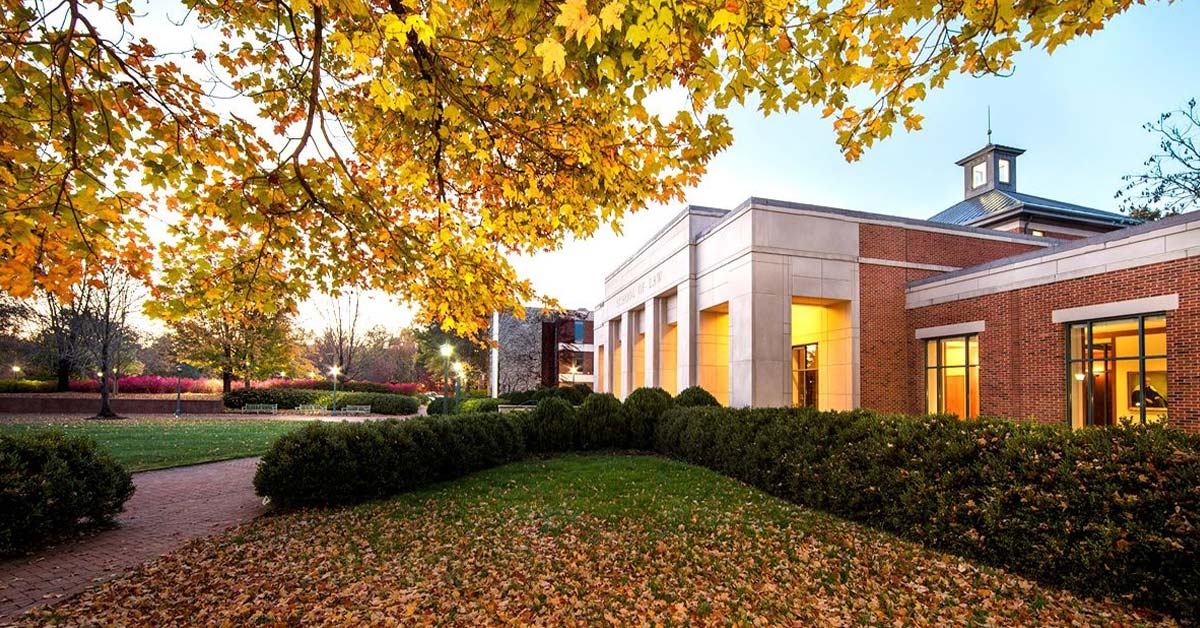
The University of Virginia is a public institution recognized for its academic prowess, public service commitment, and exceptional faculty. The institution uses a semester-based academic calendar, unlike other renowned universities. The University of Virginia School of Law is a well-regarded public law school affiliated with the University of Virginia that focuses on providing a rigorous legal education, stimulating critical thinking, and urging students to connect with the larger legal community.
The student-run honors system at the University of Virginia School of Law is notable for upholding values of honesty and integrity, with transgressions leading to student-led trials and potential expulsion for proved offenses. The university houses the Jefferson Literary and Debating group, founded in 1825, and the country’s oldest continuously debating student group, which demonstrates the institution’s great legacy of intellectual involvement. The university’s important contribution includes producing eight NASA astronauts, eight Pulitzer Prize winners, and 51 Rhodes Scholars, demonstrating its devotion to academic quality and contributions to diverse sectors. Polar explorer Richard Byrd, novelist Edgar Allan Poe, artist Georgia O’Keeffe, and Tina Fey, the talented writer, actor, and TV producer, are UVA Law alumni.
The University of Virginia is a public research university founded in 1819 by Thomas Jefferson, who sat on the university’s founding board of directors alongside two previous US presidents (Madison and Monroe). Jefferson put a library at the heart of the institution to demonstrate the founder’s dedication to pursuing deeper knowledge. The library remains an important part of the university, housing five million print volumes of books, 16 million manuscripts, and a massive digital archive to safeguard physical works such as the Jefferson Papers and rare videos from the Civil Rights Era.
Charlottesville, Virginia, a UNESCO World Heritage Site and booming tourist destination situated east of the Blue Ridge Mountains, is home to the University of Virginia. Charlottesville’s historical significance and the proximity to Washington, D.C., contribute to a unique learning experience for students at the University of Virginia School of Law, making it an attractive choice for those seeking a comprehensive and impactful legal education.
The University of Virginia School of Law has a competitive acceptance rate of 13.9%, indicating a tough admissions procedure that admits a limited percentage of applicants. Prospective candidates seeking admission to UVA Law must have an LSAT score of 167, demonstrating the institution’s commitment to accepting individuals with strong analytical and reasoning abilities. The GPA spans from 3.78 to 4.0, demonstrating a flexible attitude to academic backgrounds while still assuring a minimum degree of academic achievement. UVA Law has a remarkable 99.2% bar exam pass rate, demonstrating the quality of its legal curriculum in preparing students for successful admission into the legal profession.
Law degrees such as the Juris Doctor (JD) program are primarily offered in the UVA law school which prepares students for legal practice. The institution offers higher legal studies through its Master of Laws (LLM) and Doctor of Juridical Science (SJD) programs. The University of Virginia Law School’s dedication to multidisciplinary instruction is apparent in its joint degree programs, which enable students to integrate legal education with other fields.
The University of Virginia School of Law tuition is full-time: $74,700 (in-state) and full-time: $77,700 (out-of-state), making UVA Law a viable option for quality legal education. The University of Virginia School of Law’s moderately tough admissions procedure, emphasis on academic flexibility, and outstanding bar exam passage rate confirm it as a prestigious university for students seeking balanced legal schooling.
10. University Of Chicago Law School
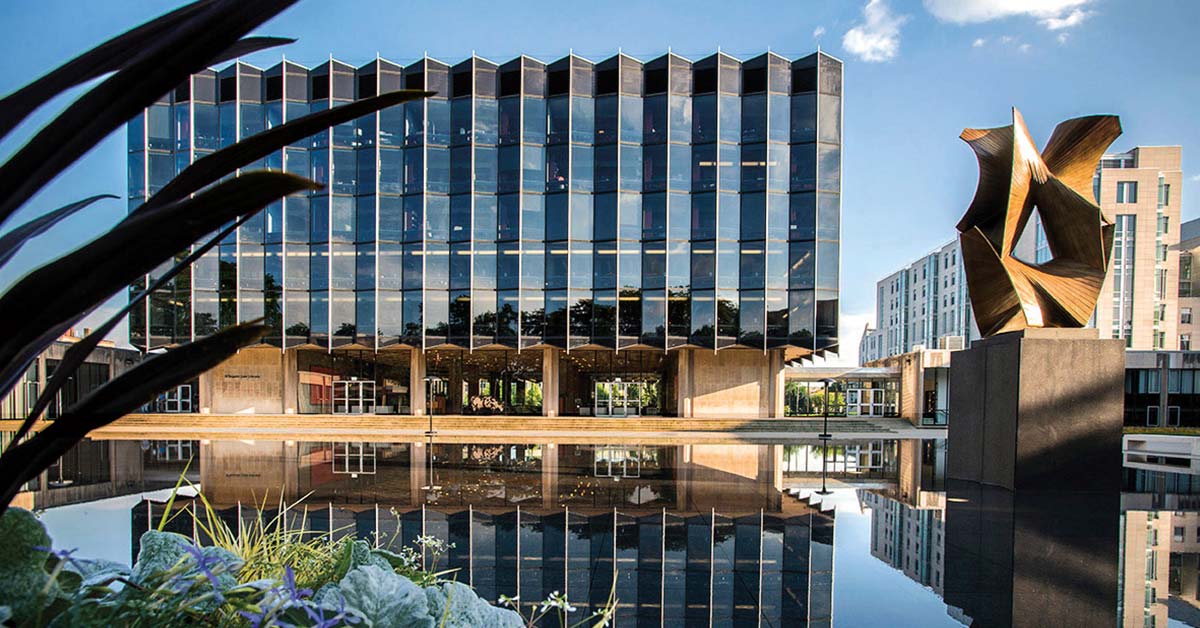
The University of Chicago is a private university with a quarter-based instructional calendar. The University of Chicago Law School is a distinguished private law school known for its challenging curriculum, integrative focus, and prominent faculty. The law school, affiliated with the University of Chicago, is an established institution in legal education.
The University of Chicago Law School embodies the values of a “Bran splinter new” institution oriented to equal chances and non-sectarianism, as envisioned by its first president. The aim is represented in the organization’s slogan, “Crescat scientia; vita excolatur” or “Let knowledge grow from more to more; and so shall human life be enriched.” Such dedication is constantly preserved by the university, being a modern research institution at the forefront of academic activities and discoveries. The University of Chicago is acknowledged for its tremendous contributions to human knowledge, including connections to over 80 Nobel laureates, 30 National Medal winners, and nine Fields Medallists. It has received roughly 50 MacArthur “genius grants,” demonstrating its commitment to encouraging new ideas.
The university’s historical significance stretches to its initial membership in the Big Ten Conference, the country’s oldest and most prestigious intercollegiate athletics conference. The University of Chicago currently organizes 19 intercollegiate sports, with over 500 players competing in 330 competitions each year. Notable graduates include prominent authors Saul Bellow and Susan Sontag, astronomer Edwin Hubble, film critic Roger Ebert, and Indiana Jones, the iconic cinematic academic and archaeologist who taught at the university. The University of Chicago’s rich tapestry of accomplishments, academic prowess, and prominent graduates strengthens its reputation as a leading school with a profound impact on various dimensions of human knowledge and culture.
The University of Chicago was founded in the late 1800s, with the state of Illinois providing an official certificate of organization in September 1890. Oil mogul John D. Rockefeller pledged $600,000 to help build the university, while a local department store owner Marshall Field gave land.
The university is located on South Ellis Avenue in the thriving city of Chicago, Illinois. The city’s vibrant urban location favors the law school being among the significant legal and business hubs in the US. It gives students distinctive opportunities for legal practice, social networking, and involvement in various businesses.
The University of Chicago Law School has a 12.7% acceptance rate, demonstrating a difficult admissions procedure that admits just a tiny percentage of candidates. Aspiring students of the University of Chicago Law School must get a median LSAT score of 173, with scores ranging from the 25th percentile at 169 to the 75th percentile at 175. The emphasis on a high LSAT score demonstrates the institution’s dedication to enrolling students with strong analytical and reasoning skills. The GPA criterion is set at 3.99, highlighting the importance of academic performance in the admissions procedure. Graduates of the University of Chicago Law School have a bar exam passage percentage of 99.8%, demonstrating the institution’s legal education’s efficacy in educating students for the efficient legal profession.
The University of Chicago Law School offers a Juris Doctor (JD) degree that provides students with a thorough legal education that prepares them to practice law. The school provides advanced legal studies through its Master of Laws (LLM) program, which serves foreign and domestic learners pursuing professional legal skills.
The tuition charge at the University of Chicago is $81,069, which reflects the cost of acquiring a legal education at one of the world’s most prominent and intellectually difficult universities. The University of Chicago Law School’s difficult admissions procedure, emphasis on academic achievement, and outstanding bar exam passage rate confirm it as an exceptional institution for students seeking a transformative and profound legal education.
11. Northwestern Pritzker School Of Law
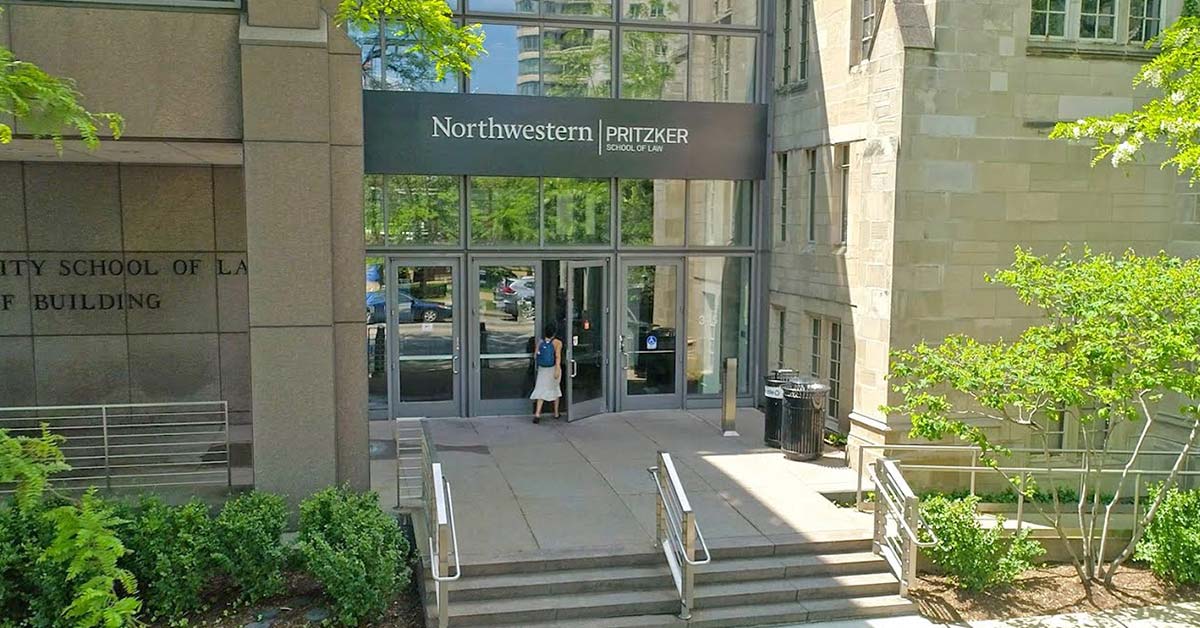
Northwestern University is a graduate school rated highly by the US annually. Northwestern University’s Pritzker School of Law is tagged as among the best law schools in the country. It is recognized for its commitment to educational excellence, cutting-edge legal education, and an intense focus on research that spans numerous fields.
The university offers graduate degrees such as The Kellogg School of Management, the School of Law, the Feinberg School of Medicine, the Robert R. McCormick School of Engineering and Applied Science, and the School of Education and Social Policy. The institution currently has 12 independent schools and colleges and is well-known for its research prowess in subjects such as neurology, nanotechnology, biotechnology, and medication development.
Northwestern University Pritzker retains its main campus in Evanston, 10 miles north of Chicago, allowing students to be close to the lively opportunities. Northwestern Law, which has had a smaller campus in Chicago and a satellite school in Doha, Qatar since 2008, offers a variety of learning environments. The Arlyn Miner First-Year Moot Court Program is a required part of the law school curriculum, where students’ involvement in the Moot Court and Trial Team groups is encouraged. Second and third-year students are allowed to join up to five legal journals and more than 30 student clubs, creating a diverse extracurricular atmosphere for each learner.
Northwestern arose to serve the wide Northwest Territory as a result of the goal of its nine founders, who lacked major resources and an understanding of higher education. In 1850, the founders purchased a 379-acre site near Lake Michigan in Evanston, named for co-founder John Evans, and began planning. Northwestern University began modestly in 1855, with two academic staff members and ten male students. Female students were admitted to the university in 1869. Northwestern has evolved from such beginnings to become a prominent private research institution with a strong integrative culture and a dedication to teaching quality.
The Northwestern Law benefits from its urban setting being situated in the vibrant city of Chicago, Illinois. It provides students with access to a dynamic legal environment and numerous opportunities for legal practice, networking, and engagement with various industries.
The Northwestern University Pritzker School of Law has a competitive acceptance rate of 15.4%, owing to a tough admissions process that admits a limited percentage of applicants. Aspiring students interested in attending Northwestern Law must have a median LSAT score of 172, showing the institution’s emphasis on enrolling individuals with high analytical and logical skills. The required GPA ranges from 3.77 to 4.0, reflecting the 25th to 75th percentile, demonstrating the importance of academic excellence in the admissions procedure. Northwestern Law graduates have a noteworthy 98% bar exam passage rate, indicating the quality of legal education the institution offers.
The primary law degree for legal education at Northwestern University Pritzker School of Law is a Juris Doctor (JD). The law school offers advanced legal studies through its Master of Laws (LLM) program, serving foreign and domestic learners desiring advanced legal competencies. The university’s tuition charge is $77,532, which reflects the expenses of pursuing a legal education from prominent law schools. Northwestern University Pritzker School of Law is a prestigious institution for students pursuing a transformative and meaningful legal education, with a demanding admissions procedure, a significant focus on academic performance, and an impressive bar exam passage rate.
12. Penn Carey Law
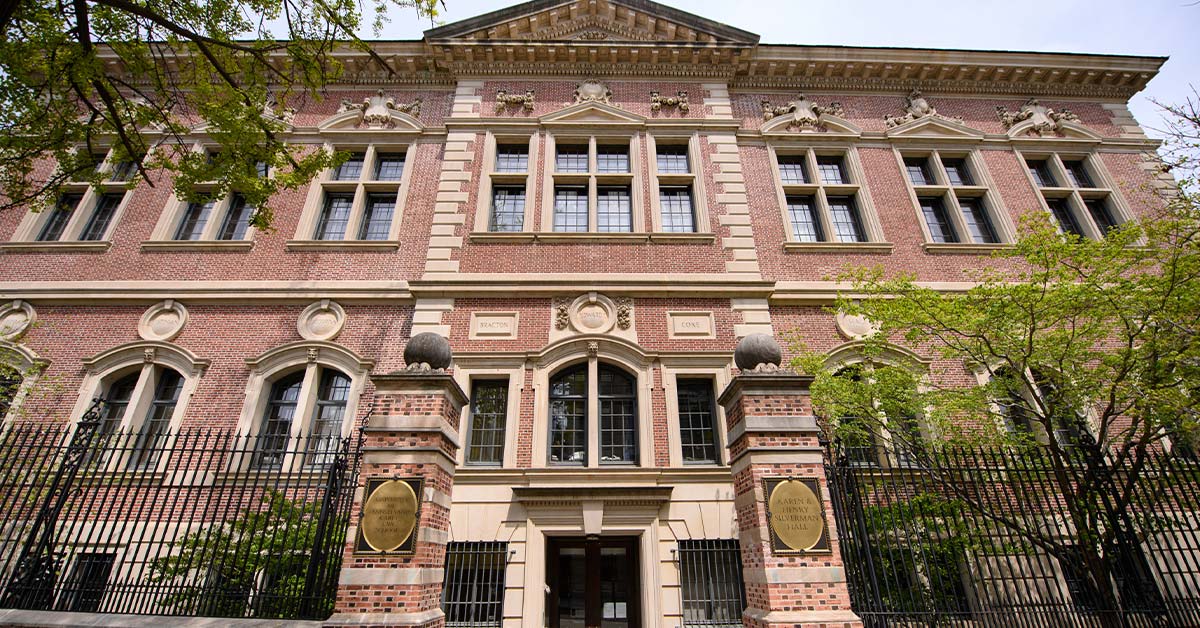
The University of Pennsylvania is a founding member of the Association of American Universities and one of the nine original Colonial Colleges – Universities formed before the United States became a sovereign nation following the American Revolution. The university is regarded as the first fully-fledged (multi-faculty) “university” in the United States.
The University of Pennsylvania Carey Law School is a prestigious institution known for its superior legal education, outstanding faculty, and dedication to developing leaders in the legal profession. It retains a major role in the legal academic landscape as one of the earliest law schools in the United States.
Some prominent alumni of the University of Pennsylvania boast from various professions including William Henry Harrison, the ninth president of the United States, and African leaders such as Nnamdi Azikiwe and Kwame Nkrumah. The university has been a magnet for academic brilliance, with associations with over 25 Nobel Laureates, including physicist Raymond Davis Jr. and economist Lawrence Klein. Its impact is seen in the literary world, with prominent modernist poets Ezra Pound and William Carlos Williams representing its distinguished literary graduates.
The university attributes its establishment to Benjamin Franklin’s visionary article in 1749 suggesting the construction of a higher education institution. The university has expanded into a prestigious institution, currently spanning a massive 302-acre campus with 200 buildings, after being granted university status 30 years ago. The campus is notable for multiple “firsts,” including the country’s first student union, a double-decker college football stadium, and The Wharton School, the world’s first undergraduate business school. The illustrious history illustrates Penn’s steadfast dedication to higher education initiatives and accomplishments.
The University of Pennsylvania Carey Law School benefits from its urban setting, which is located in the thriving city of Philadelphia, Pennsylvania, and exposes students to a dynamic legal environment. The historical significance of Philadelphia, and its role as a hub for legal practice, add to the exceptional educational atmosphere at the University of Pennsylvania Carey Law School.
The acceptance percentage of the University of Pennsylvania Carey Law School is 10%, reflecting the institution’s tough admissions process. Prospective candidates must get a median LSAT score of 172, emphasizing the importance of enrolling persons with high analytical and problem-solving skills. The median GPA requirement is 3.9, indicating the relevance of academic quality in the admission method. Carey Law School graduates have a 98.8% bar exam passage rate, proving the quality of the institution’s legal curriculum in equipping law students.
The university offers law degrees such as the Juris Doctor (JD) program, the primary professional degree for legal practice. The school offers advanced legal studies through its Master of Laws (LLM) program, which caters to students looking for advanced knowledge regarding particular legal areas.
The tuition charge for attending the University of Pennsylvania Carey Law School is $80,592, which reflects the cost of acquiring a legal education in top law schools. The University of Pennsylvania Carey Law School is a prestigious university for students wanting an immersive and impactful legal education, boasting a strong emphasis on academic quality, and an impressive bar exam passage rate.
13. NYU Law
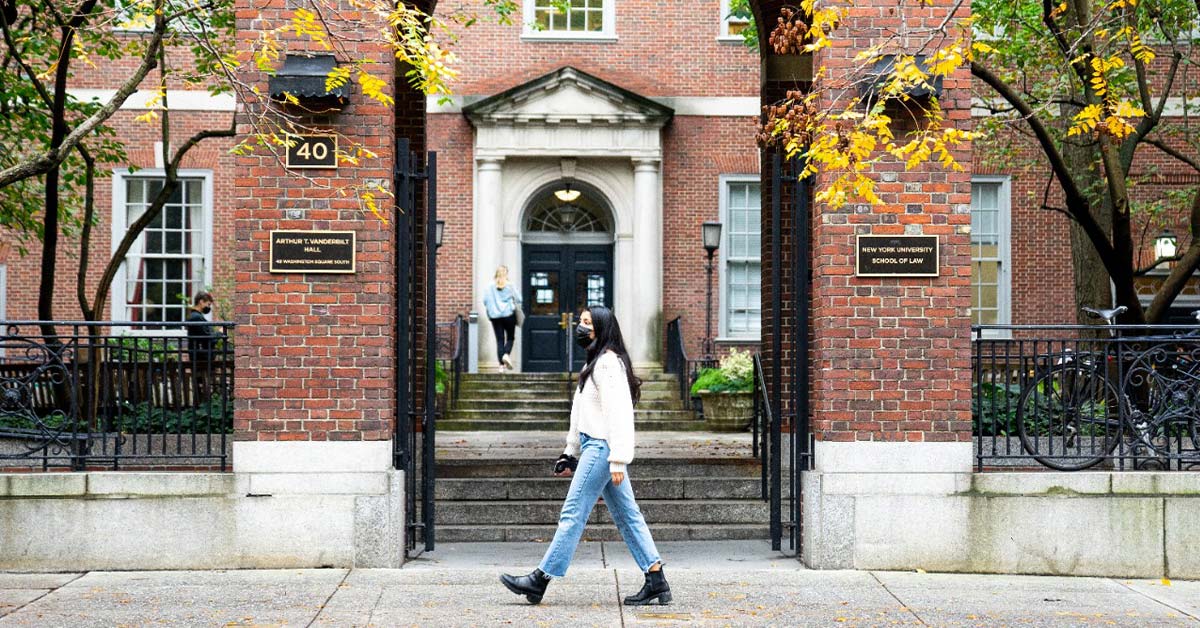
New York University is a private metropolitan school utilizing a semester-based academic calendar. New York University (NYU) is one of the most prestigious private higher education institutions in the United States. New York University School of Law (NYU Law) is a distinguished and internationally recognized legal education and scholarship institution. The university has established itself as a dominant force in legal academia, drawing students, teachers, and legal professionals worldwide.
The main campus of New York University has over 20 colleges and schools spread across five areas, including Lower Manhattan and Downtown Brooklyn. NYU has campuses in Abu Dhabi and Shanghai, official operations in 25 countries, and a local presence. The university has an extraordinary list of alumni, including Nobel and Crafoord Prize winners, Pulitzer Prize winners, and Abel Prize winners. NYU added the Bobcat after a century with the Violet as its mascot, representing the marriage of intellectual brilliance and athletic prowess. The university provides guaranteed housing alternatives to students, among the 11,000 visitors who visit the Bobst Library, one of NYU’s 11 libraries.
New York Institution School of Law was founded in 1831 with Albert Gallatin’s ambition of creating an accessible and innovative institution in the middle of the United States’ most populous city. NYU Law has evolved into a global academic center dedicated to creating research trends and cultivating talent worldwide over nearly two centuries, providing substantial financial aid to students and solid financing for research endeavors.
The main campus comprises 1 km2 of land and is located in the center of Lower Manhattan, near Sixth Avenue and Washington Square Park in New York. Students benefit from exceptional chances for experiential learning, apprenticeships, and networking due to their proximity to legal institutions, courts, and top law firms.
The careful admissions method at NYU Law results in a competitive acceptance rate of 16.7%. Aspiring candidates interested in attending NYU Law must have a minimum LSAT score of 172, highlighting the relevance of excellent analytical and reasoning skills in the admissions procedure. The GPA criterion is 3.8, demonstrating the importance of academic excellence. Graduates of NYU Law have a noteworthy bar exam passage percentage of 99.2%, indicating the school’s legal education competence in educating students for profitable legal careers.
NYU Law offers various legal degrees, including the Juris Doctor (JD) program, which is the prerequisite for legal practice. The school offers advanced legal study through various Master of Laws (LLM) programs to international domestic learners pursuing specialized competence in certain legal disciplines.
The tuition charge for entering the New York University School of Law is $83,152, which reflects the cost of acquiring a legal education at one of the nation’s top law schools. NYU Law is a prestigious university for students pursuing an innovative and profound legal education in the bustling city of New York, with a tough admissions procedure, a heavy focus on academic quality, and a respectable bar exam passage rate.
14. Cornell Law School
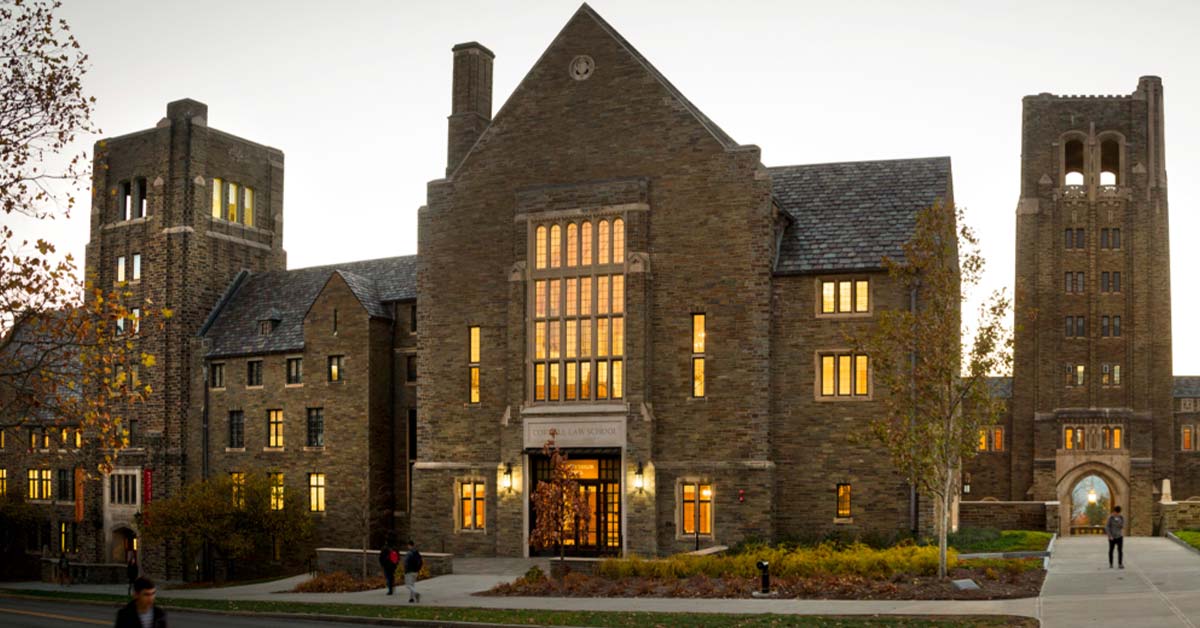
Cornell Law School is a prestigious institution noted for its dedication to offering a rigorous legal education while cultivating a diverse and intellectually engaging atmosphere. Cornell Law School operates under Cornell University, a private Ivy League institution dedicated to “discovering, preserving, and disseminating knowledge.” Cornell Law has a reputation for excellence in legal study and practice.
Cornell University is a federally funded land grant institution with a private endowment and six campuses worldwide. The main campus spans 2,300 acres of the Finger Lakes region where students go hiking without having to leave campus due to its massive land area. It includes a graduate medical school in New York City and a base in Rome where students learn art, architecture, and urban design. Cornell has 45 Nobel laureates on its faculty and alumni, including Taiwanese President-elect Tsai Ing-wen and Huey Lewis, leader of the band Huey Lewis and the News.
Cornell Law School is part of an institution that values unique student traditions, such as Dragon Day, in which freshmen students display a gigantic dragon throughout campus every year. The Cornell Chimes, another long-standing tradition since Cornell’s founding in 1865, features daily bell presentations by “chimesmasters” on top of the historic McGraw Tower, featuring a repertoire encompassing many musical styles.
Cornell Law School, founded in 1865, has a long history of excellence in legal education, with its first law class of nine students completed in 1888. The establishment of graduate programs leading to the J.S.D. and LL.M. Degrees in 1929 represented a watershed moment in the school’s educational programs. Cornell Law School made history in 1966 when it became the first law school to be granted permission to allow third-year students practicing at its Legal Aid Clinic to participate in court. Cornell Law School has played a vital part in creating the legal landscape across its history by making substantial contributions to legal scholarship, research, and the career progression of its students.
Cornell Law School is located in Ithaca, New York, which benefits from its scenic campus environment and closeness to major legal hubs. The tranquil settings are appropriate for serious academic pursuits, while the location in upstate New York provides exceptional opportunities for connecting with legal practitioners and engaging with local legal activities.
The competitive recruitment method at Cornell Law School results in an impressive acceptance percentage of 23.1%. Applicants interested in attending Cornell Law must have excellent analytical and logical skills, with an LSAT requirement ranging between 169 and 175, demonstrating one’s aptitude for legal studies. The median GPA requirement is an excellent 3.89, demonstrating the emphasis on academic quality in the recruitment procedure.
Cornell Law School graduates have a noteworthy bar exam passage percentage of 95.8%, demonstrating the institution’s legal education’s efficacy.
Cornell Law School offers a variety of judicial degrees, including the Juris Doctor (JD), the main professional degree for practicing lawyers. The school offers extensive legal studies with its Master of Laws (LLM) program, catering to both domestic and international students looking for specialized training in specific legal fields.
Cornell Law School’s tuition price is $81,416, indicating the commitment required for a thorough legal education at one of the country’s most prestigious law schools. Cornell Law School is a reputable university for students wanting an innovative legal program in a unique and intellectually distinguished atmosphere, with a challenging admissions procedure, an elevated focus on academic quality, and an impressive bar exam passage rate.
15. Georgetown University Law Center
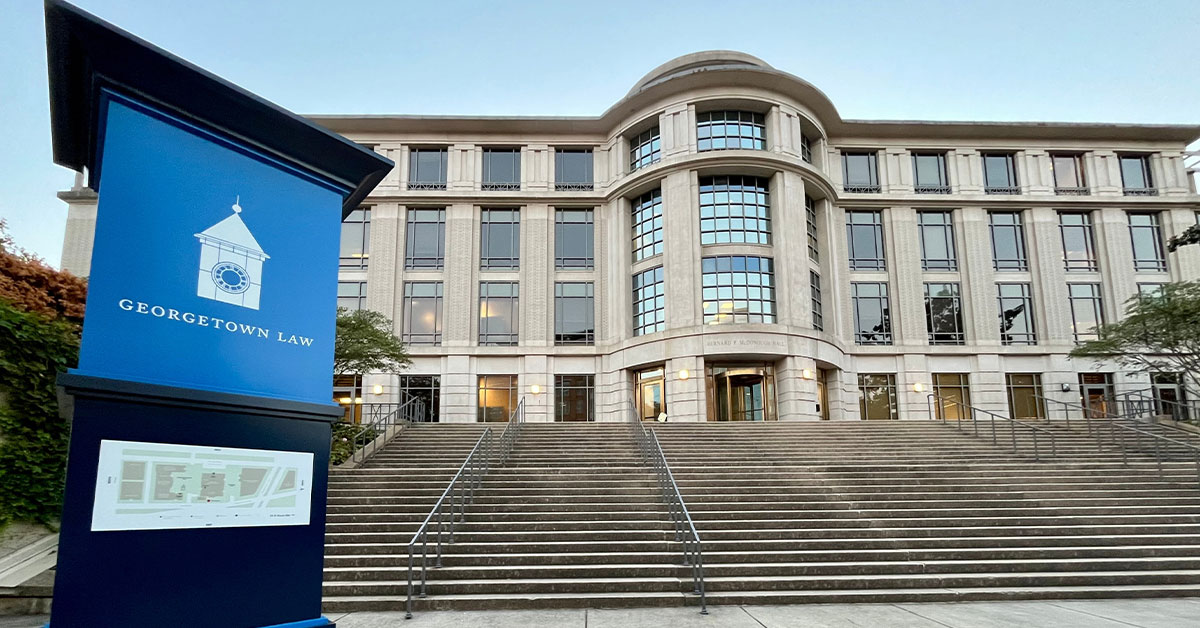
Georgetown University is a private university considered the country’s oldest Catholic and Jesuit institution of higher learning. The Law Center at Georgetown University is a distinguished organization known for its ongoing dedication to academic superiority, legal study, and public service. Georgetown Law has an international reputation for creating outstanding legal practitioners and contributing to legal knowledge growth.
Georgetown University has nine undergraduate and graduate schools, such as Georgetown College, which focuses on liberal arts, and the Edmund A. Walsh School of Foreign Service, which is known for teaching global leaders. The university has a particularly international student body that represents approximately 130 nations with over 7,000 undergraduate and roughly 10,000 postgraduate students. Georgetown’s Jesuit legacy continues to have an impact despite its independence from the Catholic Church, cultivating an educational atmosphere that emphasizes service to the vulnerable and underprivileged.
Among Georgetown’s distinguished alumni, recognized as Hoyas, are US Defense Secretary Robert Gates, former European Commission President José Manuel Barroso, and Jordan’s King Abdullah II. Bradley Cooper is a prominent member of the Hoya community. The university has nurtured two former US presidents, Bill Clinton and Lyndon Johnson, and a number of other heads of state, demonstrating its importance in world leadership and diplomacy.
The university was founded in 1789 by John Carroll, the first bishop and archbishop of the United States, and conferred its first bachelor’s degrees in 1817. The university experienced a tremendous struggle during the American Civil War, with the student body decreasing from 313 to 17 between 1859 and 1861. It was in the aftermath of the war that Georgetown experienced a transformation by altering its curriculum. The modification stressed history and natural sciences and commenced the development of Healy Hall, a significant structure on campus. It was spearheaded by Patrick Healy, the university’s president from 1873 to 1882 and the first African American to achieve a Ph.D.
Georgetown University is located at 37th and O Streets NW in Washington, D.C., benefitting from the strategic position among significant legal and government organizations. The proximity of federal agencies, courts, and advocacy groups provides law students with exceptional avenues for apprenticeships, work experience, and interaction with practicing attorneys and legislators.
Georgetown University maintains strong academic standards for entry, with a 20.1% acceptance rate. Interested students are anticipated to have outstanding academic credentials, with an LSAT score of 171 and a GPA of 3.72 or higher. The university’s dedication to academic quality is apparent in its stringent entrance requirements. Georgetown University has a 96.4% Bar Exam Passage Rate, demonstrating the institution’s dedication to delivering students with a comprehensive and successful legal educational experience.
The university offers a few law degrees particularly the Juris Doctor (JD) program, the foundational educational pathway for practicing law. The Law Center offers specialized master’s degrees such as the Master of Laws (LLM) and the Executive Master of Laws (Executive LLM).
The tuition cost at Georgetown is $79,672, emphasizing the investment necessary to gain access to the university’s excellent professors, large resources, and active academic community. Georgetown University provides an excellent educational opportunity with a worldwide perspective regardless of expense, owing to its rich history, prominent alumni network, and dedication to Jesuit principles.
How To Choose The Best Law School In The US?

To choose the finest law school in the United States, consider the following factors:
- Reputation. Assess the school’s reputation by looking at its rankings among law schools and its standing in the legal community. Law schools ranked based on their image and reputation. Strong reputations are frequently associated with higher educational standards and more favorable employment prospects.
- ABA Accreditation. Verify the school’s accreditation with the American Bar Association (ABA). Most states usually require ABA certification to qualify a student for the bar, as it guarantees the caliber of legal education.
- Bar Passage Rate. Look into the passing rates for the school’s bar test. A high passing percentage suggests that students are adequately prepared for the profession of law.
- Career Services and Alumni Network. Assess the quality of the school’s alumni network and its career support services. One’s post-graduation job prospects are greatly impacted by having a strong network and access to active career services.
- Specializations and Faculty Expertise. Seek out universities with faculty members who have specialized in areas of law that one is interested in. It improves one’s educational experience and gets one ready for particular legal professions.
How Can Lexinter Help Choose A Law School In The US?
Lexinter can help choose a Law School in the US by providing in-depth information about the best law schools to attend. Lexinter is an online legal resource that is a great resource for prospective law students looking for the best law school in the United States. The platform provides thorough articles and insights into the greatest law schools in the United States, including information on faculty expertise, specialization areas, campus culture, and alumni success.
Such articles dig into the different sorts of legal degrees that these institutions provide, such as the Juris Doctor (JD), which is the standard degree required to practice law in the United States. A profile on a law school noted for its strong environmental law department, offering a JD with a specialization in environmental law is an example.
Lexinter stands out for its thorough articles regarding law schools and the credentials of its writers. Many of the lawyers and legal experts who write for Lexinter are graduates of the country’s top law schools and had their best law degrees. They offer credibility and insight to their advice as they draw on personal experiences and professional knowledge. Aspiring law students must use firsthand knowledge to make educated decisions about where to study, what specialization to pursue, and how to prepare for a successful legal profession. Lexinter is an important resource for prospective students, bridging the gap between them and the elite world of legal school.
Lexinter provides a platform to find attorneys who have achieved numerous milestones in the practice of law and learn their educational background. It enables aspiring students to follow the same pathway, which starts in the law schools they attended.
How Can The Choice Of Law School Affect The Type Of Law Degree To Get?
The choice of Law School can affect the type of Law Degree to get by the legal education and future career trajectory. Different law schools have diverse strengths, resources, and specializations that correspond or do not correspond with the specific interests and professional aspirations.
One normally obtains a Juris Doctor (JD) degree if one wants to pursue a traditional legal career in the United States. Almost all law schools in the United States provide the JD, which is the primary degree required to practice law in the country. The nature of the JD experience differs depending on the law school one attends.
Some law schools excel in specific subjects such as corporate law, public interest law, or technology law, which influence the course of one’s studies and the opportunities accessible during one’s law school years, such as internships and networking events. The expertise and reputation of the school affects the type of law degree to get.
The law school one attends directs toward several advanced degrees, such as a Master of Laws (LL.M.) or a Doctor of Juridical Science (SJD) if one chooses to pursue a more specialized or academic legal profession. Law schools with strong international ties, for example, provide more comprehensive LL.M. programs that attract students interested in specializing in international law or practicing law in another country. Selecting a law school known for its SJD or Ph.D. programs is critical if one wants to work in legal academia or conduct highly specialized research.
Consider the minimum qualifications it provides, and how its distinctive strengths, culture, and academic offerings connect with one’s long-term educational and career goals while choosing a law school. The appropriate law school gives one a personalized path that leads to a law degree and prepares one for the precise legal job one wants.
What Law School In The US Has The Highest Acceptance Rate?
The Law School in the US with the highest acceptance rate is Thomas M. Cooley Law School, with an acceptance rate of 47.6%. The rate is significantly higher than that of many other law schools, indicating a unique approach to legal teaching and admissions.
Thomas M. Cooley’s broader admission strategy is a major contributor to the high acceptance percentage. Thomas M. Cooley provides opportunities to a broader range of students unlike more elite law schools, where high GPAs and LSAT scores are required. The open-door policy is shown in their acceptance of students with GPAs as low as 2.86 and LSAT scores as low as 146, which are much lower than the thresholds imposed by top-tier institutions. The school welcomes a broad student body, including students who do not fulfill the severe criteria of other law schools due to a variety of obstacles or non-traditional educational backgrounds.
The objective of Thomas M. Cooley Law School is to promote extending access to legal education. The purpose is consistent with their high acceptance rate since they aim to provide legal education options to a diverse group of people. The inclusiveness is useful for students who have experienced educational, socioeconomic, or other challenges that have prevented them from being admitted to more selective law schools.
Another consideration is the school’s capacity to accept a high number of students. Thomas M. Cooley has one of the largest student bodies among law schools in the United States, allowing it to keep a high admission rate. Such a capability indicates the school’s infrastructure and its dedication to teaching numerous legal professionals.
Regional demand and clever marketing play an impact. Thomas M. Cooley Law School actively markets its programs to attract a high number of applicants from all around the country. The method, together with its open admittance policy, adds to the high acceptance rate.
Do The Best Law Schools In The US Offer Pre Law Courses?
Yes, the best law schools in the US offer Pre-Law Courses. These top-notch colleges of law in the US supply Juris Doctor (JD) education and some pre-law courses.
Top-tier law schools such as Yale University, Harvard University, and Stanford University supply degrees for aspiring law students that deliver them benefits when they enter law school. These pre-law programs are designed to prepare students for law school and a legal career. Pre-law courses include coursework in areas such as economics, philosophy, English, and political science, and critical thinking, writing, and public speaking skills. These are not mandatory for law school admissions; law schools in the U.S. accept students from a wide range of undergraduate backgrounds.
Students interested in attending top law schools in the U.S. must focus on excelling in their undergraduate studies, regardless of their major, and performing well on the Law School Admission Test (LSAT). Admissions committees at elite law schools look for strong academic records, high LSAT scores, and other factors such as relevant work experience, extracurricular activities, and personal statements.
Is It Better To Attend A Top Ranking U.S. Law School For Pre-Law Studies?
Yes, it is better to attend a top-ranking US law school for pre-law studies. Attending a top-tier law school has various benefits. Lawyer colleges are associated with a high level of academic rigor, notable faculty, and vast resources, such as well-stocked libraries and chances for legal research. They have excellent alumni networks, which are quite beneficial for job placements and professional progress, which is advantageous for people wanting to have their pre-law studies in top-ranking US Law Schools.
Graduates of famous legal schools are seen as more appealing candidates by top law firms, corporations, and government organizations, potentially leading to more lucrative and prestigious job possibilities. Premier law schools provide a comprehensive range of specialized courses and clinics, allowing students to study a variety of legal topics and get practical experience. These institutions’ competitive climate is a tremendous motivation, driving students to perform and fully develop their legal talents.
What Law School In The US Is The Hardest To Get Into?
The law school in the US that is the hardest to get into is Yale University. Yale Law School has an exceptionally low acceptance rate, frequently admitting 5.3% of applicants. It is one of the lowest rates among all law schools in the US, indicating the school’s very selective admissions procedure. The enormous volume of submissions from highly qualified people from all over the world contributes to the competitive environment, making admission difficult for even the most accomplished applicants.
Yale Law School sets an extremely high standard in terms of academic qualifications. Applicants must often have great undergraduate GPAs, which start at 3.91 to 4.0, and extremely high LSAT scores which are at 170 or higher. Yale Law School’s admitted student median scores are consistently among the highest in the country, highlighting the school’s concentration on superior academic performance.
Yale Law School’s famous reputation adds to its selectivity. The appeal of Yale Law School attracts a large pool of ambitious and bright applicants. Yale Law School is known for producing renowned legal scholars, influential legislators, and thought leaders in numerous sectors. Such a reputation raises competitiveness and adds to the school’s attraction as a top-tier legal education institution.
Yale Law School’s admissions procedure is notable for its comprehensiveness. The institution focuses a strong emphasis on qualitative qualities aside from quantitative metrics such as GPA and LSAT scores. Personal statements, letters of recommendation, and extracurricular accomplishments are rigorously scrutinized to assess each applicant’s distinctive talents, prospective contributions to the Yale community, and overall fit for the school’s challenging and intellectually engaging environment.
Yale Law School’s small class size contributes to its high selectivity. The school maintains an intimate learning environment, which stimulates deeper involvement and interaction but implies fewer accessible slots for prospective students in comparison to other top law schools.
How Much Does Law School In The US Averagely Cost?
Law school in the US averagely costs $40,000 to $100,000. Private law schools in the United States are often the most expensive, with an annual tuition costing roughly $53,034. These colleges of law frequently charge higher prices because of their independent funding arrangements, reliance on tuition for a large amount of their budget, and the range of facilities and services they provide. The high average cost of law school reflects the reputation and thorough legal education provided by many private law schools, which include huge legal libraries, famous staff, and diverse course options.
Public law schools, on the other hand, have lower tuition costs, particularly for in-state students. Annual in-state tuition at public law schools is around $29,610. Out-of-state students attending public law schools pay a higher tuition, an average of $42,754 per year. State governments subsidize these costs to some extent, making them more affordable to citizens of such states. Public law schools are a more inexpensive option than private institutions even for students that are living outside of the state.
Tuition costs vary greatly between law schools in Michigan. The University of Michigan Law School, one of the nation’s best law schools, is the most costly in the state, with yearly tuition rates of $72,974 (in-state) and $75,974 (out-of-state). The high price is due to its prestigious standing, extensive resources, and thorough education. The University of Michigan Law School is well-known for its brilliant faculty, diverse specializations, and strong national and worldwide reputation, all of which contribute to its higher tuition rate.
Wayne State University Law School, on the other hand, provides the most affordable legal education in Michigan, with a tuition rate of $43,460. Wayne State University’s Law School receives state financing as a public university, which helps keep tuition rates low. It makes it an appealing alternative for aspiring law students looking for a more cost-effective road to a legal degree. Wayne State University Law School offers a high-quality legal education, with strong academic programs and opportunities for practical practice despite being less expensive than its counterpart, the University of Michigan.
Can You Become A US Lawyer Without Law School?
Yes, you can become a US lawyer without law school. The most standard way to become US lawyers is to receive a Juris Doctor (JD) degree from a law school approved by the American Bar Association (ABA) and then pass the bar test in the state where one desires to practice in the United States. A few states, however, provide an alternate approach known as “reading the law” or an apprenticeship model.
The alternate route permits a prospective lawyer to learn under the mentorship of a professional attorney or judge instead of completing law school. Such a path is available in states such as California, Virginia, Vermont, and Washington. The procedure entails several years of study under a practicing attorney, and the candidate must fulfill certain standards and pass examinations prescribed by the state’s bar association.
Such a path is uncommon and fraught with difficulties. The apprenticeship route necessitates a high level of discipline and commitment because it lacks the controlled environment and resources of a law school. People who qualify for the apprenticeship way have fewer employment prospects because some businesses prefer applicants with traditional law school experience. The alternative method is only available in a few states, and passing the bar test does not mean that someone is entitled to be a lawyer in other states.
How Long Is Law School In The US?
Law school in the US spans three years for full-time students. It is the normal course of time for enrollees seeking a Juris Doctor (J.D.) education, which is the requisite education to work as a lawyer in the country. Every law school in the U.S., whether public or private, adheres to the expected period for their full-time J.D. programs.
There is flexibility in the course period for attending law school for enrollees who select to attend law school on a part-time basis. The J.D. program naturally extends to four years for part-time students. The extended time frame accommodates enrollees who have jobs or have other obligations that preclude them from registering in a full-time schedule.
The J.D. program encompasses a thorough syllabus intended to supply a foundational comprehension of the law, and technical learning in various legal subjects regardless of whether students are enrolled full-time or part-time. The first year is focused on core courses, such as constitutional law, contracts, torts, and civil procedure, while the latter years allow for more specialized electives and practical experiences such as internships or clinics.
How Hard Is It To Get Into Law School In The US?
Admission to law school in the United States is highly competitive. Prospective students typically need to demonstrate strong academic performance, particularly in their undergraduate studies. A high Grade Point Average (GPA) is often a critical factor in admissions decisions. The Law School Admission Test (LSAT) score plays a significant role in academic performance. The standardized test assesses reading comprehension, logical, and verbal reasoning skills, and is a key component of most law school applications.
The competitiveness of law school admissions varies widely among different schools. Top-tier law schools, such as the ones in the Ivy League, have exceptionally low acceptance rates and require outstanding GPAs with a minimum of at least 3.3 and 170 or higher LSAT scores. Additional factors such as compelling personal statements, strong letters of recommendation, and notable achievements or experiences are crucial for these elite institutions.
A personal statement is one requirement to enter law school in the US, and it must be outstanding to compete with the other applicants who have excellent experiences and passion for pursuing law. A personal statement must be submitted, which includes one’s unique experiences, achievements, motivations for pursuing law, and how one contributes to the law school community. A strong personal statement showcases the applicant’s writing skills, critical thinking, and provides insights into their character and potential as a law student.
Not all law schools in the U.S. are as intensely competitive. Mid-tier and lower-tier law schools have more lenient admission standards, though they still seek candidates with solid academic backgrounds and reasonable LSAT scores. These schools provide opportunities for students who do not have a perfect undergraduate record but have shown potential and improvement over time.
Some law schools take a more holistic approach to admissions, considering a broad range of factors beyond GPA and LSAT scores. These include work experience, community service, extracurricular activities, and other life experiences that contribute to a candidate’s overall profile.
How Do US Law Schools Train Lawyers Who May Influence Supreme Court Landmarks?
U.S. law schools train lawyers who may go on to influence Supreme Court landmarks by providing a rigorous legal education, emphasizing critical thinking, analytical skills, and a deep understanding of legal principles and precedents. The foundation of such education is a curriculum that combines theoretical knowledge with practical skills that help deal with matters in the Supreme Court landmarks.
The first year of law school, often considered the most challenging, focuses on core subjects such as constitutional law, contracts, torts, civil procedure, property law, and legal writing. These foundational courses are crucial for understanding the legal system and the principles that underlie U.S. law, including people who govern Supreme Court decisions.
Many law schools offer specialized courses in constitutional law, civil rights, appellate advocacy, and other areas directly relevant to Supreme Court jurisprudence in addition to the standard curriculum. These courses allow students to delve deeper into the complexities of the Constitution and the judicial process. Professors, often distinguished legal scholars and practitioners themselves, play a pivotal role in shaping students’ understanding of the law and its potential for societal impact.
Law schools provide opportunities for experiential learning through clinics, internships, and moot court competitions. Moot court is a simulation of appellate court proceedings, which is especially relevant for understanding the Supreme Court’s work. These experiences allow students to practice legal research, writing, and oral advocacy skills in a realistic setting, preparing them for potential future involvement in high-level legal cases.
Law review participation offers another avenue for students to engage deeply with current legal issues. Writing for a law review involves rigorous legal research and analysis, often on cutting-edge legal topics. Such experience hones students’ abilities to critically analyze and contribute to legal scholarship, influencing future legal debates and court decisions.
Is Getting Into The Top Law Schools In The US Worth It?
Yes, getting into the Top Law Schools in the US is worth it. Attending a top law school provides several substantial benefits. These universities are well-known for their tough academic programs, excellent faculties, and vast resources. A legal degree from a prominent law school leads to positions in elite law firms, federal clerkships, and high-level posts in the public and commercial sectors. These schools’ networking opportunities are unrivaled, with links to notable alumni and industry leaders.
Top law schools oftentimes supply a manifold range of specializations, research prospects, and extracurricular activities, allowing students to tailor their learning to their unique interests and professional goals. US Law Schools’ education and experiences provide graduates with a thorough understanding of the law, excellent deductive and problem-solving skills, and the capacity to manage complicated legal difficulties.
Are There Part-Time Law Programs In US Law Schools?
Yes, there are part-time law programs in U.S. law schools. These programs are intended to accommodate enrollees who are unable to commit to a full-time law school schedule due to work, household obligations, or other personal engagements.
Part-time law courses offer the same syllabus as full-time programs but spread over a longer period, usually four years instead of the standard three years for a full-time Juris Doctor (JD) program. The extended timeline allows part-time students to manage a reduced course load each semester, making it more feasible to balance law school with other life obligations.
Students who need to work during the day benefit from these programs by holding classes in the evenings, on weekends, or online. These programs are strict and require the same level of commitment and dedication as full-time programs despite their part-time nature. Students in part-time programs receive the same comprehensive legal education, covering foundational law courses, electives, and practical training opportunities.
Part-time law programs are extremely prevalent at law schools in populated cities, where there is a higher concentration of working individuals seeking to obtain a legal degree without leaving their current employment. Prospective students must be aware that juggling law school with work, even part-time, is tough and urges strong organizational and time management abilities.
How Prestigious Are The Top Law Schools In The US?
The top law schools in the United States are highly prestigious. It is largely due to their rigorous academic programs and esteemed faculties. These schools consistently rank highly in law school rankings and are recognized for their challenging curricula, often delivered by leading legal scholars and practitioners.
The prestige is further bolstered by highly selective admissions processes. These elite institutions accept only a small percentage of applicants, ensuring a student body with exceptional academic and professional achievements. The selectivity fosters a competitive and ambitious environment, enhancing the schools’ reputations.
The success of their alumni significantly contributes to their prestige. Graduates from top law schools frequently secure influential positions in various sectors, including private practice, academia, government, and public service. The achievements in the legal profession and beyond reflect the quality of education provided by such universities.
Top law schools are known for their high bar passage rates and strong employment outcomes, indicative of the effective preparation they provide for legal careers. They are leaders in legal research and scholarship, contributing to legal thought and policy on a global scale.
Is Law School Harder Than Med School?
No, Law School is not harder than Med School. Law School and Med School are equally difficult based on the demands of their field of expertise.
Law school focuses extensively on reading, writing, and analysis. Students must comprehend difficult texts, build arguments, and think critically about legal topics. The effort is heavy, with each class requiring a large amount of reading and preparation. The competitive environment, particularly at top law schools, adds to the stress.
Medical education, on the other hand, requires a strong foundation in the sciences and places a significant focus on memorizing and application of a massive quantity of medical knowledge. It entails extensive study in anatomy, physiology, biochemistry, and other disciplines. Clinical rotations provide students with hands-on experience diagnosing and treating patients as part of their medical training. The stage is extremely difficult because it requires practical abilities and substantial medical knowledge.
These pathways necessitate a high level of dedication and tenacity, and rigorous times, such as the bar test for law students and board examinations and residencies for medical students.

